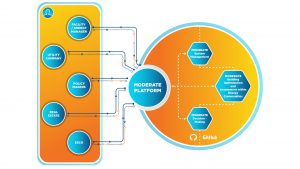The MODERATE project aims to connect data providers and consumers by a marketplace offering high-quality open datasets and interoperable open-source services for buildings.
The ever-increasing use of building monitoring and control systems brings an opportunity for data-driven approaches in the entire construction sector. Simultaneously, data exchanges and interoperability among data platforms remain a challenging issue and have been placed high on the agenda by the European Union (EU) institutions as crucial elements for enabling the ambitions set forth by the European Green Deal.
To this end, the EU is working on two fronts. Firstly, through the Data Act, the EU is developing a new framework to enable the sharing, storage, and processing of industrial data. Secondly, in the building industry, the revision of the Energy Performance of Buildings Directive specifies ambitious targets in terms of fair access to and use of buildings data, to facilitate the full interoperability of services and data exchange within the European Union.
The MODERATE project is a project funded under the Horizon Europe programme, which aims at improving exchange of building data and interoperable data-driven services targeting Europe’s building stock. The team gathers experts from the building industry, data science and software engineering sectors from across Europe to boost the availability and use of building data in the EU.
MODERATE formalises a set of procedures and techniques that enable building owners, facility managers, energy service companies (ESCOs), utility companies, product manufacturers, and policymakers, to openly share their data, gain insights, and make decisions while complying with regulations such as the General Data Protection Regulation (GDPR).
Moreover, MODERATE enables uniform access to heterogeneous data sources on buildings’ performance, usually dispersed in several non-interoperable data silos.
Several initiatives recently emerged to address the problem of defining a modular data architecture, to which MODERATE contributes with:
- A protocol for data sharing and anonymisation, compliant with GDPR and further requirements on privacy and confidentiality of information but avoiding losing the statistical properties that make information valuable;
- A solution enabling data owners to openly share their datasets with data consumers while profiting both economically and in terms of knowledge from their data; and
- A fully open platform. The MODERATE project will develop an open platform, embracing leading-edge technologies, such as Artificial Intelligence (AI), Machine Learning (ML), Distributed Ledger technologies, and the Internet of Things. This platform will enable users to analyse data collected from various building systems and provide insight into the many dimensions of a building’s performance. The use of synthetic data generation techniques, not yet widely applied in the construction industry, is one of the elements that allow open data sharing, enabling more reliable services and generating business opportunities.

The importance of data collection and data enrichment
Accurate and reliable data on the building stock, such as energy consumption and uses, are required to inform building stakeholders’ decisions. Both a top-down approach (i.e., using aggregated data at the national or regional level, based on statistical models and assumptions) and a bottom-up approach (i.e., collecting data on individual buildings from satellite imaging and monitoring) to data collection are combined in a scalable methodology to generate high-quality datasets representing building stock characteristics, energy performance and actual consumption patterns. The methodology has been tested in different case studies, then accuracy, reliability and cost-effectiveness have been evaluated.
A first case study dealt with automatically classifying building energy performance certificates (EPCs) based on the analysis of satellite images. Although there are several limits, obtained results provide a first indication of the potential of using satellite images for the classification of EPCs.
In the second case study, a Machine Learning tool has analysed aerial images to detect installed photovoltaic panels and estimate the installed photovoltaic capacity on rooftops in urban areas. In a third case study, the distribution of PV installations in industrial and residential areas was characterised based on GIS data, merging footprints of buildings integrated with the existing rooftop PV installations, and land use, then returning land use by residential/industrial areas, number of buildings with PV installations, total PV area, height, and footprint of buildings with PV.
Although this approach is still at its initial phase and further improvements are required, it has the potential to provide an efficient and cost-effective method for assessing the energy performance and characteristics of buildings on a large scale.
This is where data synthetisation and data enrichment techniques come into play. The ability to combine information from various sources – i.e., database for energy performance of buildings, monitoring data from technical building systems, GIS data and remote sensing solutions – will pair in the MODERATE project with the recent advancement of Machine Learning and Artificial Intelligence tools to generate improved datasets and answer needs by the emerging EU policies and open new opportunities by data-driven analytics.
Nonetheless, privacy or business-related confidentiality can be a major obstacle to data exchange and limit the availability of detailed datasets on buildings. In this regard, the use of synthetic data is very promising to mask sensitive information and reduce re-identification risks on household identity or personal preferences and habits, while preserving the statistical characteristics of the original data.
MODERATE will generate and publish open synthetic datasets enriched by combining different building characteristics, filling gaps, and generating more complete and comprehensive datasets at different levels of data aggregation. MODERATE will improve the quality and completeness of existing datasets merging information from multiple sources and models and produce new datasets describing specific building energy consumption, load profiles, indoor environment quality, and lifecycle performance in a consistent way.
The process of generating synthetic data comes with technical, legal, and ethical challenges, which the MODERATE project will solve by corresponding functionalities in the open platform and thanks to support from advisors, early adopters, and open-source community.
The ability of collecting and enhancing information without revealing personal or confidential information will allow the exchange of otherwise confidential data and to boost new services for the building industry and the policymakers.
Innovative data-driven services built with building industry
MODERATE will develop a set of open-source, data-driven services and functionalities that aim to improve the analysis of the building performance, effectively helping users to turn raw data coming from buildings into meaningful knowledge and decision making.
Such analytics are the main interaction point for the users, which can get insights and support based on data available on the platform and/or user data. On the other hand, analytics rely on several underlying MODERATE functionalities and features, which enable the connection and proper use of data.
The MODERATE project will develop three categories of services:
- MODERATE System management. These services can be used for monitoring the building performance through data analysis, providing valuable insights into energy consumption and potential inefficiencies through fault detection, optimisation of technical building systems, and guidance for planning upgrades i.e., replacement, staged renovation and deep energy retrofit of buildings.
- MODERATE Building optimisation and assessment. These services evaluate building performance and identify areas for improvement in terms of solar rooftop potential, cost savings, and overall building performance. They will support EPC arrangement for energy efficiency and renewable energy projects, as well as Measurement and Verification of energy upgrades implemented by ESCOs, the assessment of potential benefits from installing renewable energy sources and establishing energy communities by utility companies, benchmarking energy and non-energy related key performance indicators (KPIs) for buildings in their portfolio by energy and facility managers.
- MODERATE Analytics for decision making. This category is focused on impact evaluation of decisions and policies, i.e. helping building managers make informed choices about resource allocation and energy management. Services will support in evaluating effect and risk related to actions and policies on building, building portfolio, and building stock.
Solutions are co-developed and tested by consortium partners on their business workflow, first looking for effective and practical decision support tools.
As an additional feature, the platform will allow users to generate tailored workflow by connecting external data sources and service application programming interfaces (APIs) within a simple environment.
ENCOME (ENergy COnservation MEasure) tool
Increasing the energy efficiency of existing buildings is a priority from three different points of view: the environment, the security of energy supply, and the quality of life of citizens. The renovation of existing buildings has a particularly high potential and proper energy-saving measures, from economic and operational points of view, should be applied in building renovation. ENCOME aims at simplifying performance evaluation of the building and defining the priority of energy upgrading interventions.
As a core, the web app tool simulates the energy performance of buildings using the standard ISO 52016-1:2017. As a result, an hourly energy and operative temperature profile is calculated. The model can then be calibrated with data provided by the user. The user can evaluate the possible improvements to apply on the building to reduce the energy consumption and improve the indoor comfort. At this stage, it is possible to evaluate the effects of 31 Energy Conservation Measures (ECM) applied to the building envelope (roof, wall, and window) and HVAC system (generation and emission systems).
The ENCOME tool simulates the performance of different energy conservation measures to estimate energy savings, environmental impact, and financial outcomes.

As a result, the tool generates reports and recommendations based on the analysis conducted. These reports highlight the energy-saving potential, associated costs, and anticipated benefits of implementing each conservation measure.
Results can be further processed by the benchmarking tool. MODERATE marketplace will host information related to several building portfolios, mostly available as open synthetic datasets, and support uploading of new user data.
To streamline users’ inputs (such as geometric dimensions or characteristics of vertical and horizontal opaque and transparent components), a Building Information Modeling (BIM) model of the building can be connected. This development is carried out in co-operation with H2020 INFINITE project and software houses.
By using the ENCOME tool, organisations can streamline the process of identifying, evaluating, and implementing energy conservation measures. It enables them to prioritise efforts, maximise energy savings, reduce environmental impact, and make informed decisions regarding investments in energy efficiency. ENCOME can also be a support for designers, helping them in the early design phase to evaluate the best possible solution to apply on buildings aiming to reach specific energy targets.
Benchmarking tool
The benchmarking tool is an open-source web app, which allows measuring and evaluating the building energy and comfort performance against normal behaviour of own buildings, best practices, or competitors (external datasets). By comparing performance metrics with benchmarks, it is possible to identify areas of improvement and set new performance targets and resources.
The benchmarking tool enables ongoing monitoring and tracking of building performance. It can identify inefficiencies and set up regular benchmarking cycles to measure progress over time, identify trends, and give the possibility to adjust as needed.
For this last point, the tool allows an advanced comparison of energy consumption data, for the same building in different periods, through the identification of a simple analytical model. In fact, the user can choose the proper model for the baseline period data and use this model as a simulation for the reporting period, evaluating both the consumption trend and any savings obtained. The tool can also suggest the most suitable model for the data.
In summary, a benchmarking tool of buildings can support real estate companies, municipalities, policymakers, energy managers, and planners to to compare specific buildings in terms of energy performance, comfort and costs, while being informed about best practices and energy consumption trends. It empowers construction professionals to make data-driven decisions and drive continuous improvement in their operations.
The MODERATE project: Key takeaways
The MODERATE project will develop a marketplace platform for sharing high-quality standardised open datasets related to building characteristics and performance, and a range of interoperable open-source data-driven services, developed according to workflows by real players from the building industry.
By leveraging an open and collaborative approach, MODERATE will combine key data science and engineering competences to serve a growing community of users.
Real estate companies, energy service companies (ESCOs), energy and facilities managers, and utility companies will have the unique opportunity to test the business value before investment and implementation of their own informed decision-making process.
Policymakers will also benefit from MODERATE datasets, models and methodologies for data collection, enrichment, and harmonisation, i.e., for benchmarking impact of specific policies across different areas or building stock sectors.
The MODERATE project will support data exchanges complying with the most recent requirements in terms of standardisation, legal and ethical aspects, tackling data collection, enrichment, and use. In short, MODERATE will serve functionalities and methods for producing, sharing, and consuming high-quality datasets for informed decision making, promoting co-operation with other initiatives and open-source community.
 This project has received funding from the European Union’s Horizon Europe research and innovation programme under grant agreement No. 101069834. Views and opinions expressed are however those of the author(s) only and do not necessarily reflect those of the European Union or CINEA.
This project has received funding from the European Union’s Horizon Europe research and innovation programme under grant agreement No. 101069834. Views and opinions expressed are however those of the author(s) only and do not necessarily reflect those of the European Union or CINEA.
Please note, this article will also appear in the fifteenth edition of our quarterly publication.









